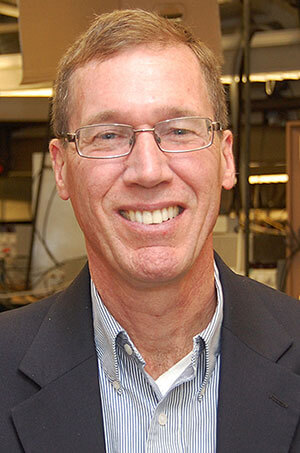June 19, 2017
Purdue chemist Timothy Zwier receives Humboldt Research Award
 Timothy Zwier
Timothy Zwier
Download image
WEST LAFAYETTE, Ind. — Timothy Zwier, Purdue University's M.G. Mellon Distinguished Professor of Chemistry, has earned the prestigious Humboldt Research Award for his work in physical chemistry and molecular spectroscopy.
The international award is given to fewer than 100 researchers from all academic disciplines each year by Germany's Alexander von Humboldt Foundation. The award recognizes researchers who have made significant discoveries that have influenced their fields, and who are expected to continue producing such advances in the future.
Zwier's research provides insights into many areas of scientific research, ranging from something as small as the components of individual proteins to the vast atmospheres of the moons of Saturn. His work also is used to better understand the chemistry of combustion in engines.
The Humboldt Research Award includes a cash award and an opportunity to spend up to a year in Germany collaborating with colleagues at an institution there, at the University of Göttingen in his case.
Craig K. Svensson, dean of Purdue's College of Pharmacy and interim dean of the College of Science, praised the far-ranging applications of Zwier's work.
"Dr. Timothy Zwier is a world-class physical chemist whose research group has developed innovative laser techniques to probe the fundamental structure and reactions of important molecules," he said. "His research is relevant to our understanding of critical biological reactions, chemical combustion and the chemical effects of light in interstellar space and planetary atmospheres."
Christine A. Hrycyna, professor and associate department head in the Department of Chemistry, said Zwier's work has provided new insights into the inherent properties of molecules in isolated form in the gas phase, where perturbations from surroundings are removed.
“Tim Zwier is a world-renowned physical chemist and molecular spectroscopist who, with his students and postdoctoral fellows, has conducted pioneering work on the microwave, infrared, and ultraviolet spectroscopies of stable molecules and reactive intermediates known to be important in a wide range of scientific areas, including combustion, planetary atmospheres, cluster science, and molecular biology,” she said. “His innovative laser-based approaches and capabilities are providing new and exciting insights into the preferred shapes and dynamics of key molecules, free radicals and ions relevant to these fields.”
The Humboldt Research Award is one of the most prestigious awards in science, and Purdue has had a number of recipients over the years, including Natalia Dudareva, distinguished professor of biochemistry and horticulture and landscape, in 2016, said Peter Hollenbeck, vice provost for faculty affairs.
“This international recognition of the research being done by our faculty signals to the scientific community that Purdue is an innovative environment where cutting-edge achievements are impacting the world," Hollenbeck said.
Writer: Steve Tally, 765-494-9809, steve@purdue.edu, @sciencewriter
Sources: Timothy Zwier, 765-494-5278, zwier@purdue.edu
Craig Svensson, 765-494-1368, svensson@purdue.edu
Christine Hrycyna, 765-494-7322, hrycyna@purdue.edu
Peter Hollenbeck, 765-496-3509, phollenb@purdue.edu

